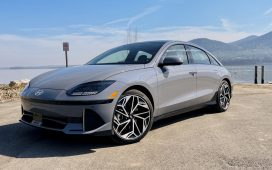Waymo’s robotaxi service area in San Francisco is expanding to 47 square miles of the city — a significant expansion of the company’s driverless ridehail operations.
Last August, Waymo and its driverless rivals won approval from California regulators to operate their commercial service 24/7. The vote was a significant win for the tech industry, which has been battling criticism that its robot cars occasionally obstruct emergency vehicles and cause traffic jams.
Growing the number of people who want to pay Waymo for trips is incredibly important for the company, which spent at least $1.1 billion on autonomous vehicles between 2009 and 2015 — a figure that has assuredly grown exponentially in the proceeding years. Waymo will need to increase its revenue significantly if it hopes to turn autonomous vehicles into the profitable business that tech prognosticators have been promising for years.
Giving those customers access to a broader swath of the city will be key to turning more of those users into loyal customers.
To be sure, Waymo’s service isn’t yet available to anyone who downloads the Waymo app and wants to ride. The Alphabet-owned company is in the process of onboarding more riders from its waitlist, which it expects to complete in short order.
“This territory expansion applies to those riders who currently have access to our service and all those to be added from the waitlist in the near future,” Waymo spokesperson Christopher Bonelli said in an email. “We are still seeing very strong demand, so we want to scale responsibly to maintain service quality and good user experience.”
Scaling responsibly is the watchword because Waymo has faced significant opposition, not just from residents but also city officials and law enforcement. The city’s transit agency and fire and police departments have all logged complaints about robotaxis in general and have called on the state to delay their rollout. Residents have expressed concern that robot cars could hurt jobs or detract from efforts to reduce car use overall.
Waymo needs to balance the concerns of critics with the need to scale so it can afford to launch similar robotaxi services in other cities. The company also operates in Phoenix and Austin and is piloting a robotaxi business in Los Angeles. And it plans to deploy its next-generation driverless vehicle, an electric minivan built by Geely’s Zeekr, by next year.
Update October 11th 11:08AM ET: Updated to clarify that tens of thousands of Waymo customers were getting access to a larger service area in San Francisco.











